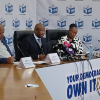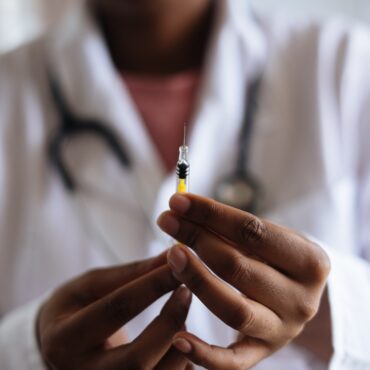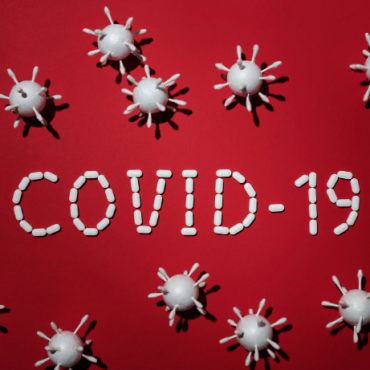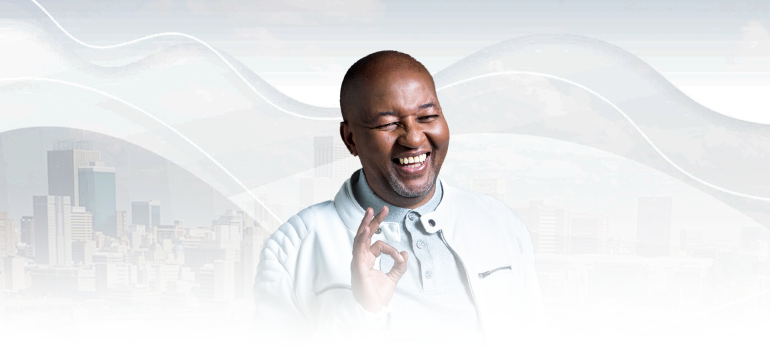-
play_arrow
On The Street On The Air | Kaya 959
COVID -19 tech partnerships sets South Africa on a good foot for future pandemics
By Tunicia Jegels and Marvin Adams
Can South Africa successfully realise its plans to close the digital divide at a time when it can no longer afford not to?
The global COVID – 19 pandemic with its devastating impact on health systems, is introducing African countries with the opportunity to leapfrog public and private healthcare systems into the age of big data and Artificial Intelligence (AI). The move towards technology driven responses to health emergencies may change the way government’s address future pandemics forever. Data shows that COVID -19 health spending will differ across low, middle and high income countries suggesting that the adoption of technological innovations in health will continue to be as unequal as access to quality health services.
Financing the health response to COVID19
Many African governments are still failing to make basic healthcare services accessible to everyone and digital infrastructure remains concentrated in the metropolis . Digital healthcare remains a luxury for most. The global pandemic however forced economies and governments to increase its uptake of digital solutions to promote remote work and contactless interaction to minimise risk and infection. Most countries have adjusted budget allocations to boost the healthcare response to the pandemic, presenting a window to implement new and existing technologies.
The World Bank warned that higher debt servicing could lower public spending on social sectors, including health, and risk progress to universal health coverage in a report, ‘Global spending on health: Weathering the storm’ which states that budget prioritisation for health has historically not driven increased public spending on health. “But COVID-19 has laid bare the interlinkages between health and economic growth and productivity. That stark realisation can trigger different approaches to health within overall budgeting. The surge in financing the COVID-19 emergency response can catalyse broader system strengthening for routine health services, including general testing capacity and information systems for surveillance,” the December, 2020 release said. It found that throughout 2020, the pandemic exerted multiple pressures on health spending but countries responded with exceptional budget allocations. “Supplementary budgets for the health response to COVID-19 represent on average 36% of preCOVID-19 public spending on health in low income countries and 13% in middle income countries,” the authors found. The World Bank estimated last year that additional financing to the tune of 1.5 percent to 3 percent of GDP for sub-Saharan Africa was needed to fight COVID-19. This, coupled with rapid policy intervention to boost digital access and communications technologies further opened a window of opportunity to modernise health services.
Leveraging partnerships to make digital technology work for COVID -19 response
In South Africa, the Independent Communications Authority of South Africa (ICASA) issued emergency temporary spectrums to meet the sudden rise in demand for broadband services under the national state of disaster regulations. A sum of R100 million was allocated to enable small businesses to service higher demand for digital access and to narrow the digital divide. “It is important that we seek to overcome the challenges that we are faced with, technologies must be accessible and we therefore call upon authorities to make sure there is type approval of network equipment and handset devices based on the applicants meeting predetermined criteria,” said Communications and Digital Technologies Minister Stella -Ndebeni Abrahams during a COVID -19 response briefing. South Africa’s digital and communications strategy showed an intensified and renewed commitment to partnering with tech companies in the private sector and network service providers to assist with data analytics, increased bandwidth and contact tracing.
5G is expected to transform the speed and accuracy at which health systems can track and trace infections. Chinese tech giant Huawei is helping African countries stay connected during the outbreak with free video conferencing facilities with its partner platform, WeLink. Similar growth has been recorded for the use of other video meeting applications like Zoom, Windows teams and Google meet. “The world has been left reeling by the latest strain of coronavirus – COVID-19. History may well record the virus, and its management, as the first pandemic of the digital age,” said Huawei’s CMO of ICT Infrastructure, Kevin Zhang.
Digital technology may have improved operational efficiency just in time for an unprecedented crisis like COVID -19, particularly with respect to standards of medical care that could set the country on a good footing for future pandemics. “Sub-Saharan Africa has become an emerging arena for digital health innovations directed at strengthening health care, in terms of both patient management and disease surveillance and prevention. Across the region with the world’s largest burden of disease and the most severe shortage of health-care workers, we see increased use of digital health solutions and interventions for clients, health-care providers, health-system managers, and data services. As the traditional health-care systems are typically ill-equipped, understaffed, or not accessible at all, sub-Saharan Africa is booming with digital health,” said an analysis in the Lancet Digital Health Journal.
Praekelt.org is a South African tech company that uses very simple technology such as SMS, USSD and WhatsApp to connect patients and citizens, health workers and the health system to improve health and health outcomes. This includes the ‘Mom Connect’ platform offered on existing platforms like Whatsapp and SMS. “When a mother in South Africa goes to a clinic, for her first antenatal visit, she is asked whether she would like to sign up to the program or not. If she signs up, she would be able to receive messaging on a very simple device completely free of charge throughout her pregnancy, with additional support until the child is 2 years -old. Not only does she receive advice, she also has a feed mechanism to give the department of health feedback or ask questions,” said Debbie Rodgers, Managing Director.
At the same time the company helped South Africa’s government mitigate the risks associated with the ‘infodemic’ that resulted in fake and misinformation around the new coronavirus circulating to thousands of people daily. “We were able to roll this project out extremely quickly at the beginning of March in 2020 when we realised just what a problem information around COVID19 was becoming. We ourselves recieved misinformation through social media platforms like WhatsApp. We knew that the Department of Health was a source of information for citizens and so using the technology we had been using for two years turned into an overnight success. We saw a very high uptake of the program within 12 weeks and by March 2020, 8.2 million users on Whatsapp used the service,” said Rodgers. The successful project showed the value of digital communication channels for ensuring that the latest up to date information is available to as many people as possible.
She believes there is an increased understanding of the value of real time data decision -making and the acceptance of telemedicine to relieve the burden on the physical health system. In fact telemedicine regulation was adjusted for renewed demand at the start of the pandemic. Rodgers explains some of the tech being used to enhance digital tools used in the pandemic by the South African Government. The company identified some of its services both used and available since the start of the global pandemic which included.
- Mobile applications for health workers to assist in screening (CMore programme)
- Digital tools to help automate some of the contract tracing efforts of the NDOH (COVIDConnect)
- Bluetooth enabled weak contact tracing (COVIDAlert Application)
- COVID information services over WhatsApp ( ContactNDOH and HealthWorkerConnect on WhatsApp)
- Risk assessment tool over USSD and WhatsApp (HealthCheck)
- Electronic Vaccination registration and scheduling system (EVDS).
Chinese tech companies like Huawei have been at the forefront of getting the country Artificial Intelligence (AI) ready. Despite a missed opportunity to digitise contact tracing from the onset of the pandemic on the ground, the company believes South Africa will be ready to fully use tech to beat future pandemics. “Think about these paper forms that is being used by contract tracers what happens with that paper is very interesting, because here is critical data on this form notwithstanding that it should not be paper it should be digitally in this new world if they partner with us we can give them the tablets and contact them to 5G. The digital process makes use of an automated approach where a location or proximity system on a user’s phone or some other identifier provides information on who the infected individual has been in contact with,” added the Cloud Business VP.
Langeveld said that this shows the breadth of digital health solutions and interventions in sub -Saharan Africa and the opportunities that lie within the African context which is accelerated by the large proportion of young people who are eager users of smartphones. He said that Huawei is taking a long term view to help SA develop the infrastructure needed to be that backbone of digital healthcare.
“The next time we have a pandemic, how it works now when you get to a building, they take your phone number and temperature. Hopefully they will call if something goes wrong. In future using the Huawei Cloud Platform, you will take that piece of paper, scan it by using our Optical Character Recognition (ORC) services and our OCR services will pick up the person name, cellphone number and using the technology we have that we call bot technology (AI) the robot will phone everybody on that list to inform them that they need to isolate and ask them if they have symptoms than the robot would connect the person immediately with a healthcare practice in their proximity of their location. We have the ability to do that today,” he said.
In December 2020 the company opened up the second availability zone. “So, we don’t only have one hyper scale data centre, we have two hyper scale data centres. The reason why that is important is that when you have two hyper scale data centres, it means that when the government or anybody in South Africa stores their data in our cloud all of that data stays in South Africa. It means data sovereignty is not an issue because the data never leaves the country, number one, and number two only the owner of the data can see the data and no-one from China or Huawei can access that data,” he added.
There are two ways of testing for COVID19. The one is the normal swab test, and the NCID test which uses a scan of the lungs. COVID19 creates marks on the lungs that are picked up through these scans.
“We were able to train the robots on our cloud every time you do a scan and you give us the scan within 20 seconds we can tell you if that person has COVID. That’s why we can marry the scan and technology and receive the outcome you want. Why can we do this? Because we have computing on a hyper scale,” He said.
Other useful tech partnerships between the public and private sector included the Vulnerable Communities Map that displays demographics and several vulnerability factors affecting the identified areas. This initiative was birthed through an initiative with a tech recruitment company, OfferZen. Smaller popular applications use the pandemic to boost their offering. Eskom Se Push was primarily used to make load shedding schedules available but quickly introduced a dashboard of updated COVID -19 data on infections, deaths and recoveries.
Digital inequality a major factor
A survey was conducted in 2020 by Research ICT Africa which found that in countries, like South Africa, that have a dual economy with high income inequality and unemployment, there is no one-size-fits-all solution to contact tracing. Most automated contact tracing hinges on owning a smartphone, bluetooth technology or having internet access. With limited smartphone ownership, which correlates with Internet access, uptake of South Africa’s new COVID Alert App has been limited.
Current estimates from the 2018 ‘After Access Survey’ are that between 49 and 52% of the rural population and between 63% and 69% of the urban population own a smartphone. A national contact tracing system that depends on smartphone ownership alone naturally leaves a large section of population (mostly the low income portion of the population) locked out of the contact tracing programme.
While some reports offer a realistic view of the digital gap like the: Bridging the Gap Between Digital Skills and Employability for Vulnerable Populations. The G20 policy briefs published in 2020 warns Individual barriers such as low digital literacy skills and the shortage of connectivity are important to address when boosting the digital health activity in the region. State of the mobile money industry in Sub-Saharan Africa 2018 report mentions to make digital health flourish within sub-Saharan Africa, enabling environments need to be created that are firmly anchored within the local context, driven by African needs, endorsed by decision makers such as national governments and supported by global key players such as the United Nations and WHO.
In addition, governments have no control over the biggest players operating in their jurisdictions according to Alison Gillwald, Adjunct Professor, Nelson Mandela School of Public Governance, University of Cape Town. “These near-monopoly global platforms are largely unaccountable to anyone. Platforms that are offering millions of people social value services are also – wittingly or not – exposing them to mass surveillance, public and private. This is popularly referred to as surveillance capitalism,” she said in a comment and analysis of South Africa’s policy responses to 4IR.
“This work was produced as a result of a grant provided by the Africa-China Reporting Project at the Journalism Department of the University of the Witwatersrand. The opinions expressed and conclusions drawn are the author’s own and do not represent those of the project.”
Written by: Zuko
COVID -19 tech partnerships sets South Africa on a good foot for future pandemics COVID 19 Life COVID-19
Similar posts
-
MORE ARTICLES

70 political parties will be contesting the May 29th

Welcome to Kaya 959 Glen Lewis

“My brother-in-law keeps coming to my place with his side chick” – The Blindspot

Sizok’thola presenter Xolani Maphanga granted bail

“I’m just building a legacy” – Lady Du is building her second Wawa La Beauty spa franchise
-
QUICK LINKS
UpComing Shows

Feel Good
With Andy Maqondwana
Feel good about feeling good! That's exactly what The Feel-Good show is about. An escape from the negativity that surrounds us, indulging you in good feels. Pass it on to one and all. Spread the good feeling around Gauteng with Andy Maqondwana.
close
Kaya Biz
With Gugulethu Mfuphi
The world of business is simplified for you by Kaya Biz with Gugulethu Mfuphi. This fast-paced award-winning business show talks to the corporate giants as well as up and coming entrepreneurs about their wins and challenges. Gugulethu invites guests to offer their analyses of markets and economies, and also delves into issues of personal financial wellness. Kaya Biz airs Mondays to Thursdays 18h00 to 19h00.
close
Point of View
With Phemelo Motene
Point of View with Phemelo Motene delves into the day’s current affairs, touches on real issues that affect people’s daily lives and shares expert advice on questions posed by the audience. Mondays to Thursdays 20:00 to 22:00.
close
The Best T in the City
With T Bose
He has held it down in the world of mid-morning radio with the best music, riveting topics, brilliant mixes and interesting guests. Every weekday, The Best T proves why he is the BEST by connecting to you like only your bro or favourite uncle could. He lets his listeners dictate the songs they want to hear in the ever-popular Top 10 at 10, and his Three Teaspoons never run out. Catch The Best T in the City Mondays to Fridays from 09h00 to 12h00.
closeConnect with Kaya 959
DownLoad Our Mobile App
© 2024 Kaya 959 | On The Street On The Air












